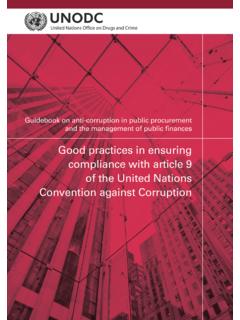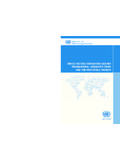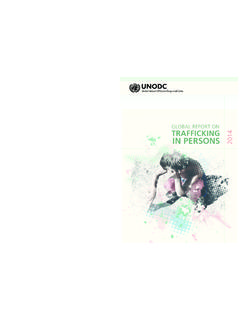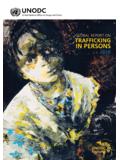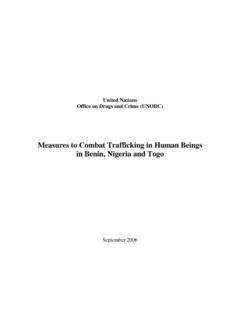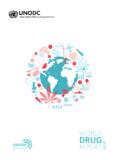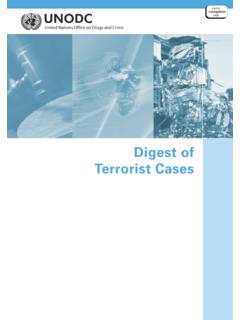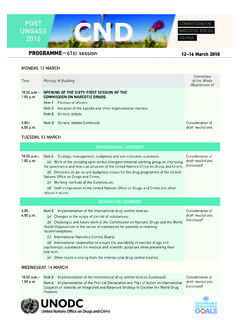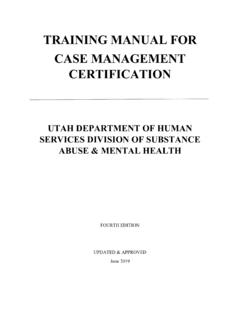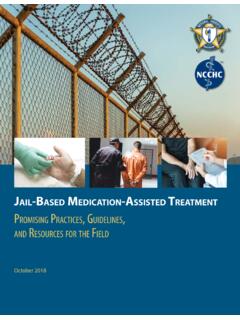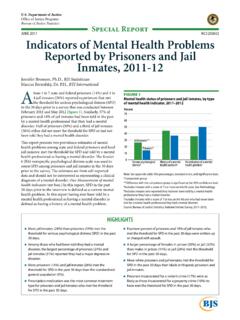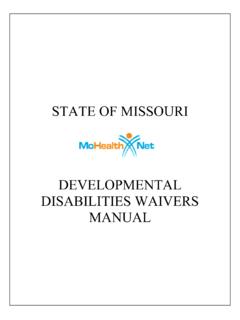Transcription of Approaches to Decriminalizing Drug Use & Possession
1 Drug Policy Alliance | 131 West 33rd Street, 15th Floor, New York, NY 10001 | voice | fax Approaches to Decriminalizing Drug Use & Possession February 2015 More than million drug arrests are made every year in the the overwhelming majority for Possession Since the 1970s, the drug war has led to unprecedented levels of incarceration and the marginalization of tens of millions of Americans disproportionately poor people and people of color while utterly failing to reduce problematic drug use and drug-related harms. The severe consequences of a drug arrest are long-lasting sometimes life-long. Drug courts, moreover, have not improved One means to reduce the number of people swept into the criminal justice system (or deported) for drug law violations is to decriminalize drug use and Possession .
2 Decriminalization is the removal of criminal penalties for drug law violations (usually Possession for personal use).3 Roughly two dozen countries, and dozens of cities and states, have taken steps toward By Decriminalizing Possession and investing in treatment and harm reduction services, we can reduce the harms of drug misuse while improving public safety and health. In the today, roughly 50,000 people are incarcerated in state prison for nothing more than Possession of small quantities of drugs. 5 Tens of thousands more are in jail , on probation, or sent to prison for a technical violation of probation or parole involving drug use or Possession . Benefits of Decriminalization Decriminalizing drug Possession and investing in treatment and harm reduction services can provide major benefits for public safety and health, including: Reducing the number of people arrested; Reducing the number of people incarcerated; Increasing uptake into drug treatment ; Reducing criminal justice costs and redirecting resources from criminal justice to health systems; Redirecting law enforcement resources to prevent serious and violent crime; Diminishing unjust racial disparities in drug law enforcement and sentencing, incarceration and related health characteristics and outcomes.
3 Minimizing the social exclusion of people who use drugs, and creating a climate in which they are less fearful of seeking and accessing treatment , utilizing harm reduction services and receiving HIV/AIDS services; Improving relations between law enforcement and the community; and Protecting people from the wide-ranging and debilitating consequences of a criminal conviction. Source: Federal Bureau of Investigation, Decriminalization Does Not Affect Drug Use Rates Countries that have adopted less punitive policies toward drug Possession have not experienced any significant increases in drug use, drug-related harm or crime relative to more punitive A World Health Organization study, for example, found that the had the highest lifetime drug use rates by a wide margin, despite its punitive policies concluding that decriminalization has little or no effect on rates of 82%18% Drug Arrests, 2013 PossessionSales/Manufacturing 2 Drug Policy Alliance | 131 West 33rd Street, 15th Floor, New York, NY 10001 | voice | fax Page In practice, decriminalization means that otherwise law-abiding people are no longer arrested.
4 Let alone incarcerated, merely for possessing a drug. The Portuguese Decriminalization Model In 2001, Portuguese legislators enacted a comprehensive form of decriminalization of low-level Possession and consumption of all illicit drugs and reclassified these activities as administrative violations. Alongside decriminalization, Portugal significantly expanded its treatment and harm reduction services, including access to sterile syringes, methadone maintenance therapy and other medication-assisted treatments. After nearly a decade and a half, Portugal has experienced no major increases in drug use. Yet it has seen reduced rates of problematic and adolescent drug use, fewer people arrested and incarcerated for drugs, reduced incidence of HIV/AIDS, reduced drug-induced deaths, and a significant increase in the number of people receiving According to the United Nations, Portugal s policy has reportedly not led to an increase in drug tourism.
5 It also appears that a number of drug-related problems have decreased. 10 Independent research concludes that there is ample evidence of a successful reform. 11 [C]ombining the removal of criminal penalties with the use of alternative therapeutic responses to dependent drug can reduce the burden of drug law enforcement on the criminal justice system, while also reducing problematic drug [and] may offer a model for other nations that wish to provide less punitive, more integrated and effective responses to drug use. 12 Hughes and Stevens, British Journal of Criminology, 2010. Other Countries Experiences In recent years, many other countries have taken steps toward decriminalization. The effectiveness of these Approaches varies considerably depending on many factors such as the quantities used to define personal Possession , and the degree to which the policy is part of a larger health-centered agenda.
6 Mexico: Mexico s 2009 decriminalization law is mostly symbolic. The threshold limits defining Possession versus trafficking were set very low and penalties for trafficking were increased. Thus, there is evidence that Mexico s law has actually increased the number of people arrested and sanctioned for drug law violations, a phenomenon known as net-widening. Mexico also has not made the same investments in treatment and harm reduction as Czech Republic: The Czech Republic, by contrast, has long integrated many elements of harm reduction and treatment into its drug policy, including low-threshold opioid substitution treatment and syringe access programs that are some of the most expansive in Europe. After its post-Soviet transition, personal drug Possession was not criminalized, but in the late 1990s, the government imposed criminal penalties on Possession of a quantity greater than small (though this quantity was never defined).
7 The Czech government conducted an in-depth evaluation and found that criminal penalties had no effect on drug use or related harms and were therefore In 2009, the country formally adopted a decriminalization law that defines personal use quantities, establishing some of the most pragmatic threshold limits of any country to have yet decriminalized. What data are available indicate that the Czech model seems to be producing net societal Netherlands: The Netherlands has a long-standing policy to instruct prosecutors not to prosecute Possession of roughly a single dose of any drug for personal use. Neither civil nor criminal penalties apply to Possession of amounts equal to or lesser than this threshold. The Netherlands has lower rates of addiction than the and much of Western Europe.
8 The Dutch also have much lower heroin overdose rates and prevalence of injection drug use compared to the The number of young people who use drugs problematically has also Colombia: A series of court decisions in Colombia essentially decriminalized small amounts of marijuana and cocaine for personal use. In 2012, the Colombian Constitutional Court reconfirmed its decriminalization ruling followed by the passage of a new law that makes drug addiction a matter of public health and obliges the state to guarantee comprehensive treatment for those who seek it voluntarily. Argentina: In 2009, Argentina s Supreme Court ruled that criminalizing Possession of drugs for personal use is an unconstitutional violation of the right to privacy and personal autonomy. As a consequence, substantial reforms have been introduced in Congress to formalize the Court s ruling.
9 3 Drug Policy Alliance | 131 West 33rd Street, 15th Floor, New York, NY 10001 | voice | fax Page What would drug reform look like? Most serious commentators call for decriminalization that is, downgrading of the status of personal drug use so that using drugs is not a crime or is a lesser is not the same as legalizing drugs. British Medical Journal, Efforts to Reduce Drug Penalties in the State Efforts to Reduce Penalties. Eighteen states and Washington, DC have reduced or eliminated criminal penalties for personal marijuana Possession . Fourteen states, as well as Washington, DC and the federal government, already treat personal Possession of other drugs as a misdemeanor not a California became the most recent state with the adoption of Proposition 47, The Safe Neighborhoods and Schools Act, in November, 2014.
10 Prop. 47 changed six low-level crimes, including drug Possession , from felonies (or wobblers) to misdemeanors. The independent Legislative Analyst s Office projected the state could save up to $250 million annually, and counties will also save hundreds of millions of dollars each year. Savings will be invested in treatment and mental health services, K-12 schools, and victim services. Prop. 47 is already significantly easing jail overcrowding in California In the nation s capital, a 2013 Public Policy Polling survey found that more than half (54 percent) support Decriminalizing Possession of small amounts of drugs other than Legislation introduced in Vermont would make it the first state to commission a study of the likely impact of A 2014 Pew poll found that roughly two-thirds of respondents believe that people should no longer be prosecuted for Possession of drugs like cocaine or In addition, 21 states and the District of Columbia have adopted 911 Good Samaritan immunity laws, which essentially decriminalize simple Possession and other minor drug offenses at the scene of an overdose.
